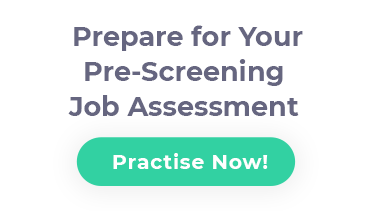AXA Assessment Tests, Recruitment Process & Interviews Online Preparation – 2025

What Is AXA?
AXA is a leading international insurance and asset management group. With over 100 million clients, parties and enterprises, they are present in 54 countries and hire over 140,000 people.
AXA is adapting to the changing world, which means more opportunities for careers and growth within the business. They have a variety of positions available, from graduate schemes to asset management and data science – there is something for every skill set at AXA.
What Is AXA’s Hiring Process?
AXA’s primary focus during the hiring process is to find the right candidate that wants to grow and flourish within the company. AXA’s values shape how they recruit, which is why you can expect a diverse hiring process, including:
Online Application
Once you have decided on the role you wish to apply for, you can begin filling in the online application form. This is a comprehensive form, so you want to ensure that you take your time to complete it. Within the application, you will be asked to submit your CV and cover letter. In addition to this, you will also have to answer some application questions. These questions focus on your work history and skill set.
Previous application questions have included:
- What are your motivations for wanting to join AXA?
- AXA has impressive growth ambitions over the next five years. How do you think we can achieve them?
The best way to answer these application questions is by showing you value what AXA does. AXA’s values are:
- Customer-first – everything AXA does is for their consumer, so try to show that you are passionate about this.
- Integrity – AXA have a strong moral compass and will not simply do things to make easy money. Show your knowledge here about your field but show that you do think about the customer too.
- Courage – AXA loves innovation and motivational leadership. Try to highlight when you have done this.
- One AXA – AXA believe strongly in teamwork; you want to demonstrate that you have worked well as part of a team, but you can also work well by yourself too.
If your application passes the application screening, you will then be invited to take part in the online psychometric tests.
AXA’s Psychometric Tests
All candidates will have to complete AXA’s cut-e psychometric tests or SHL tests as it allows the recruiters to gain an understanding of your skill set in relation to the job role. AXA uses three tests:
- Numerical Reasoning Test – In this assessment, you will be shown a variety of numerical data in the manner of charts, tables, and diagrams. Once you have had the chance to understand it, you need to use it to answer a multiple-choice question. Applicants can use calculators when dealing with mathematic questions such as percentages or ratios, as this test is not an indicator of your numeracy skills but rather your ability to understand and extract information in a short timeframe. Test takers will have one minute to answer each question, so it is vital that you work swiftly and confidently.
- Inductive Reasoning Test – For certain job roles at AXA, you will be invited to participate in an inductive reasoning test. In this test, applicants will be shown a set of shapes, patterns and matrices and should try to understand which pattern logically comes next. You will select an answer from a multiple-choice set. This test is timed, and applicants will have 20 minutes to answer 36 questions.
- Verbal Reasoning Test – The final aptitude test will seek to understand your communication and language skills. Applicants will be shown a block of text and then will be given a statement in relation to the text and asked to select whether the statement is true, false, or if they cannot say. Applicants will be given 20 minutes to answer 20 questions, so working accurately and efficiently is important.
Video Interview
If you pass the aptitude tests, you will then be invited to have a 1 on 1 video interview with the recruiter. This video interview will focus on you and your motivations for applying to AXA and will contain a few competency-based questions in order to assess your skills in relation to the role you have applied for. The video interview will last between 45 minutes to 1 hour and will give you the opportunity to ask any questions you may have about the company or role too.
Common video interview questions that AXA likes to use are:
- Why have you applied to AXA over other insurance firms?
- What attracted you to this position?
- Where do you see yourself in 5 years?
- Tell me about a time when you have faced conflict either with an employee or customer, and how did you rectify it?
AXA’s Assessment Centre
If you have impressed the recruiter, you will go on to the final stage of the hiring process, which is the AXA assessment centre. The assessment centre will last the full day, and you will be joined by up to 15 other candidates. You will take part in a variety of activities, including:
- Group Exercise – You will be placed in a small group and will be given a topic for discussion. In your group, you need to decide on the best solution for the problem which you have been given. During the task, you will be assessed by the interview panel for how well you work within a group setting and how your values tie into AXA’s.
- Role Play – You will be paired up with someone from the interview panel and will be given a brief that you will discuss with them. This will be something that relates to the job for which you are applying. For example, if you are applying for a customer service role, you might be faced with a customer complaint scenario. In the role play, you should act as though you are working within that role and show the assessor the steps you would take to deal with that customer complaint. You can use your knowledge from previous roles to help you here to show that you are confident in your abilities to get their problem solved.
- Presentation – Prior to your assessment centre, you will be given a brief and will have to create a presentation based on this. You will present this to a small interview panel (usually the hiring manager, HR representative and a senior manager) and will be expected to answer questions on it at the end. It is advised that you get across AXA’s core values and competencies here if you really want to make a positive impression.
- Written Task – Not every job role will require a written task. However, those working in higher management, marketing, communications or applying to the graduate scheme will be asked to complete one. This is an hour and a half long and will see candidates presented with a series of information about the company. Candidates will then be given time to write up a report for senior management. This task will test how well you communicate lengthy data with key stakeholders.
Final Interview
The final interview will be with a small interview panel and will focus on your motivations for applying to AXA and the job role, as well as your career history and outlook for the future. You will be presented with competency-based questions which have been designed to enable the recruitment team to understand how you work in alignment with the company’s ethos and values.
How to Prepare for AXA’s Assessments?
AXA’s online assessments are tough, but they help to provide the hiring panel with a useful and tangible perception of the competencies and intelligence of each applicant. Additionally, they help AXA to wade out those who are not right for their roles.
Preparing for AXA’s assessments is incredibly important if you want to be successful and land your next role with them. There are some fantastic ways that you can prepare yourself for their assessments, with the most popular being to take online practice tests. Practice tests provide candidates with everything they need as it allows them to understand the time pressure involved with each test. When you practice sample tests, it simulates the assessment environment. The more tests you take, the quicker you will read the information given and answer the questions.
Another key benefit of taking practice tests is that you get to see your score and answers. If you continually answer certain sections wrong, you can read the answer and understand how to do it right next time should a similar question come up on a test.
When you prepare for online assessments, you get more confident and this can help you to score better on the day of the real test as you already know what to expect and how to tackle it.

